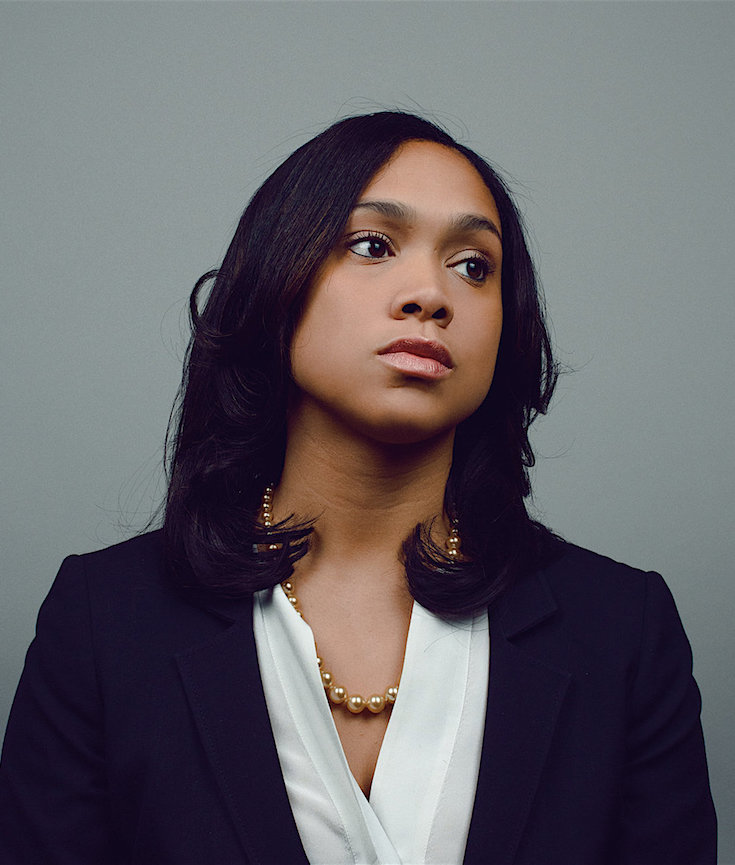[dropcap]The[/dropcap] Baltimore prosecutor—an African-American woman, putting her among the 1 percent of all elected prosecutors in the nation who are women of color—made a name for herself by doing what shouldn’t have been considered remarkable: prosecuting six police officers in the death of a black man who died while in police custody.
Reactions were as swift and blunt as she is. Detractors protested on her front lawn. Mosby received death threats that called her a “racist criminal” and called for her to be “hung,” simply for prosecuting police officers in the death of Freddie Gray. After the trial ended in three acquittals, a hung jury and a dismissal of the remaining cases, five of the six officers attempted to sue the state’s attorney for defamation—something that’s rare because of prosecutorial immunity. [mc4wp_form id=”6042″]
Mosby’s career has been largely defined by the Gray case. Next year she faces opposition for the office of the city’s state’s attorney from potential candidates Maryland Deputy Attorney General Thiru Vignarajah (best known as the prosecutor in the Adnan Syed case, made famous by the Serial podcast); Chad N. Curlett, a former New York prosecutor; and attorney Ivan Bates, who represented Baltimore Police Sgt. Alicia White in the Gray trial and is a former assistant state’s attorney under former State’s Attorney Pat Jessamy, the first woman to serve as Baltimore City’s state’s attorney from 1995 to 2011. A super PAC composed of law enforcement, attorneys and prosecutors was even formed in opposition to Mosby’s run for re-election, according to the Baltimore Sun.
 Annie Leibovitz, Vogue, July 2015 | Credit
Annie Leibovitz, Vogue, July 2015 | Credit
DEATH OF FREDDIE GRAY | BALTIMORE, MD
On April 12, 2015, Freddie Carlos Gray, Jr., a 25-year-old African American man, was arrested by the Baltimore Police Department for possessing what the police alleged was an illegal switchblade. While being transported in a police van, Gray fell into a coma and was taken to a trauma center. Gray died on April 19, 2015; his death was ascribed to injuries to his spinal cord. On April 21, 2015, pending an investigation of the incident, six Baltimore police officers were suspended with pay.
The circumstances of the injuries were initially unclear; eyewitness accounts suggested that the officers involved used unnecessary force against Gray during the arrest—a claim denied by all officers involved. Commissioner Anthony W. Batts reported that, contrary to department policy, the officers did not secure him inside the van while driving to the police station; this policy had been put into effect six days prior to Gray’s arrest, following review of other transport-related injuries sustained during police custody in the city, and elsewhere in the country during the preceding years. The medical investigation found that Gray had sustained the injuries while in transport. The medical examiner’s office concluded that Gray’s death could not be ruled an accident, and was instead a homicide, because officers failed to follow safety procedures “through acts of omission.” On May 1, 2015, the Baltimore City State’s Attorney, Marilyn Mosby, announced her office had filed charges against six police officers after the medical examiner’s report ruled Gray’s death a homicide.
Gray’s hospitalization and subsequent death resulted in an ongoing series of protests. On April 25, 2015, a major protest in downtown Baltimore turned violent, resulting in 34 arrests and injuries to 15 police officers. After Gray’s funeral on April 27, civil disorder intensified with looting and burning of local businesses and a CVS drug store, culminating with a state of emergency declaration by Governor Larry Hogan, Maryland National Guard deployment to Baltimore, and the establishment of a curfew. On May 3, the National Guard started withdrawing from Baltimore, and the night curfew on the city was lifted.
In September 2015, it was decided that there would be separate trials for the accused. The trial against Officer William Porter ended in mistrial. Officers Nero, Goodson, and Rice were found not guilty at trial. The remaining charges against the officers were dropped on July 27, 2016. (Wikipedia).


You must be logged in to post a comment.